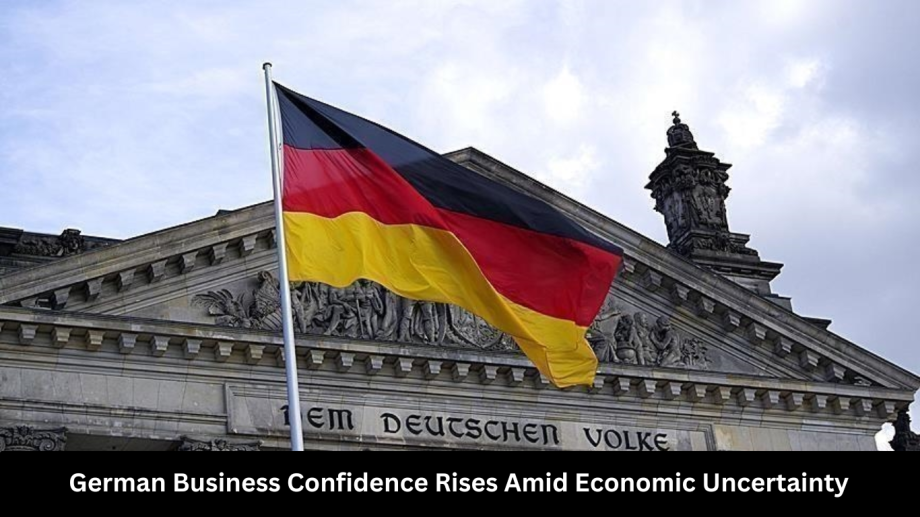Despite facing a backdrop of economic headwinds, global market volatility, and geopolitical tensions, German business confidence is showing unexpected resilience.
- Understanding Business Confidence and Its Economic Impact
- Recent Trends in German Business Sentiment
- Key Factors Driving the Uptick in Business Confidence
- 1. Easing Inflation Pressures
- 2. Improved Energy Security
- 3. Strong Export Demand
- 4. Digital and Green Investment Boom
- Sector-by-Sector Breakdown
- Challenges Remain: Why the Optimism Is Cautious
- What This Means for Investors and Policymakers
- Expert Opinions and Forecasts
- Frequently Asked Question
- What is the IFO Business Climate Index and why is it important?
- Why is German business confidence rising despite economic challenges?
- Which sectors are showing the strongest signs of confidence in Germany?
- How is inflation affecting business sentiment in Germany?
- What are the main risks still facing the German economy?
- How does improved German business confidence affect foreign investors?
- Will rising business confidence lead to economic growth in Germany?
- Conclusion
According to recent surveys and economic indicators, German firms across various sectors are increasingly optimistic about their prospects.
This renewed sense of confidence offers a glimmer of hope for Europe’s largest economy amid broader concerns about inflation, energy prices, and global supply chain disruptions.
More Read: The Ministry of Development Discusses German Business Participation in Ukraine’s Reconstruction
Understanding Business Confidence and Its Economic Impact
Business confidence is a key economic indicator that reflects how companies feel about the current and future economic environment. It influences investment decisions, hiring, production planning, and capital expenditures.
When confidence is high, businesses are more likely to expand operations, hire more workers, and invest in growth initiatives. Conversely, low confidence can lead to cutbacks and economic contraction.
In Germany, the IFO Business Climate Index, published monthly by the IFO Institute in Munich, is widely regarded as the most reliable gauge of business sentiment.
It surveys around 9,000 firms in manufacturing, services, trade, and construction, assessing their views on current business conditions and expectations for the next six months.
Recent Trends in German Business Sentiment
IFO Index on the Rise
In recent months, the IFO Business Climate Index has shown a consistent upward trend. As of September 2025, the index rose for the fifth consecutive month, climbing to 89.3 from 87.6 in August — a level not seen since early 2023.
This trend is particularly significant given that Germany narrowly avoided a recession earlier this year.
Despite stagnating growth and external pressures, companies are showing more optimism than expected. Analysts attribute this to several evolving factors, which we will explore below.
Key Factors Driving the Uptick in Business Confidence
1. Easing Inflation Pressures
Germany, like much of Europe, faced a sharp inflation spike in 2022 and 2023 due to energy shortages, supply chain bottlenecks, and geopolitical tensions.
However, inflation has gradually moderated in 2024 and into 2025, largely due to tighter monetary policy by the European Central Bank (ECB) and stabilizing energy prices.
As input costs fall and consumers regain some purchasing power, businesses feel more confident about demand prospects. Lower inflation also reduces the cost of borrowing, encouraging investment.
2. Improved Energy Security
Germany’s dependence on Russian gas made it particularly vulnerable in the wake of the Russia-Ukraine conflict.
But aggressive moves toward energy diversification, increased LNG imports, and expanded renewable energy projects have improved the country’s energy security.
This shift has not only stabilized industrial production but also reduced the uncertainty that plagued the business sector in 2022 and 2023.
3. Strong Export Demand
Despite a slowing global economy, demand for high-quality German exports — especially in sectors like automotive, machinery, and chemicals — remains strong in key markets like the U.S., China, and Southeast Asia. The relatively weak euro has also made German goods more competitive abroad.
Germany’s manufacturing base is benefiting from strong international orders, which are boosting revenue projections and improving corporate outlooks.
4. Digital and Green Investment Boom
As part of the EU’s push toward digitalization and climate neutrality, German companies are ramping up investment in green technologies and digital transformation. Government subsidies, tax incentives, and EU funding are helping businesses innovate and transition.
This new wave of investment is seen as a growth engine that could help German firms maintain global competitiveness and attract foreign capital.
Sector-by-Sector Breakdown
1. Manufacturing
Germany’s manufacturing sector, the backbone of its economy, has seen a steady rebound. The automotive industry, in particular, has benefited from easing semiconductor shortages and increased global demand for electric vehicles (EVs).
Key Highlights:
-
EV production in Germany is expected to grow by over 15% in 2025.
-
Major carmakers like Volkswagen, BMW, and Mercedes-Benz have announced new investments in EV platforms and battery technology.
-
The machinery and engineering sectors are experiencing strong export-led demand, especially from Asia and North America.
2. Services
The services sector, which includes tourism, hospitality, IT, and finance, is also seeing a recovery. With most pandemic-era restrictions long lifted, consumer-facing industries have bounced back, although they continue to face staffing challenges.
IT and digital services are growing rapidly as companies invest in cybersecurity, cloud infrastructure, and AI-driven solutions.
3. Construction
Although interest rate hikes initially slowed the real estate market, the construction sector is regaining momentum thanks to increased public investment in housing and infrastructure. The push for energy-efficient buildings and retrofitting existing structures is creating new business opportunities.
4. Retail and Consumer Goods
Retailers are cautiously optimistic. While high inflation over the past two years affected consumer purchasing power, a more stable price environment is helping restore confidence. Online sales remain robust, and hybrid retail models are gaining traction.
Challenges Remain: Why the Optimism Is Cautious
While business sentiment is rising, it’s important to note that the optimism is still cautious. Several risks continue to weigh on the German economy:
1. Sluggish Domestic Growth
Despite improving sentiment, Germany’s GDP growth remains sluggish, with the economy projected to grow by only 0.6% in 2025. This slow pace limits job creation and wage growth, keeping internal demand relatively weak.
2. Labor Shortages
Germany faces a demographic challenge with an aging population and a shrinking labor force. Skilled labor shortages, especially in engineering, healthcare, and IT, are constraining growth potential for many firms.
3. Geopolitical Tensions
Ongoing conflicts, trade tensions between the U.S. and China, and uncertainty in the Middle East create an unpredictable environment for exporters and investors.
4. Tight Credit Conditions
Although inflation is easing, the ECB has maintained relatively high interest rates to avoid a resurgence. As a result, borrowing costs remain elevated, which can limit private-sector investment.
What This Means for Investors and Policymakers
For Domestic Businesses:
Rising confidence signals a good time to resume expansion plans, invest in new technology, and explore export opportunities. However, firms must remain agile and prepared to respond to global shocks.
For International Investors:
Germany’s improving sentiment, strong industrial base, and commitment to green innovation make it a promising destination for foreign direct investment (FDI). The country remains a safe haven in the Eurozone, despite slow growth.
For Policymakers:
The German government should build on the momentum by accelerating structural reforms, streamlining immigration policies to ease labor shortages, and incentivizing innovation in SMEs (small and medium-sized enterprises).
Expert Opinions and Forecasts
Several economists and industry leaders have weighed in on the current situation:
-
Clemens Fuest, President of the IFO Institute, stated:
“The improvement in sentiment is encouraging. Businesses are seeing light at the end of the tunnel, but we must remain vigilant to global risks.” -
Carsten Brzeski, Chief Economist at ING Germany, said:
“It’s not yet a boom, but the worst may be behind us. Germany is stabilizing, thanks to resilient exports and recovering industrial activity.” -
The European Commission forecasts German GDP growth to rebound more strongly in 2026, reaching 1.5%, driven by private investment and digital transformation.
Frequently Asked Question
What is the IFO Business Climate Index and why is it important?
The IFO Business Climate Index is a key economic indicator that measures the sentiment of German businesses across sectors like manufacturing, services, trade, and construction. Published monthly by the IFO Institute in Munich, it surveys around 9,000 firms to gauge their assessment of current conditions and expectations for the next six months. It’s widely seen as a leading signal for the direction of the German economy.
Why is German business confidence rising despite economic challenges?
German business confidence is improving due to several stabilizing factors: easing inflation, improved energy security, a rebound in exports, and increased investment in green and digital technologies. While the broader economy still faces challenges, many businesses are optimistic about future growth and adapting to the new economic environment.
Which sectors are showing the strongest signs of confidence in Germany?
The manufacturing sector, especially automotive and machinery, is leading the recovery due to strong export demand. IT services, green energy, and construction are also experiencing growth, while retail and consumer services are cautiously optimistic as inflation subsides and consumer spending stabilizes.
How is inflation affecting business sentiment in Germany?
Inflation in Germany has declined from its peak in 2022–2023, thanks to ECB monetary tightening and energy market stabilization. Lower inflation has improved business margins and consumer purchasing power, contributing to a more positive outlook among German companies.
What are the main risks still facing the German economy?
Despite improving sentiment, risks include:
- Slow GDP growth (0.6% forecast for 2025)
- Labor shortages, especially in skilled professions
- Geopolitical tensions (e.g., Ukraine, Middle East, US-China trade)
- High interest rates, which could limit investment
These uncertainties continue to weigh on long-term business planning.
How does improved German business confidence affect foreign investors?
Rising confidence signals a more stable investment climate in Germany. For international investors, this suggests that German firms are well-positioned for growth, especially in sectors like clean energy, technology, and manufacturing. As Europe’s largest economy, a confident Germany enhances overall Eurozone stability.
Will rising business confidence lead to economic growth in Germany?
While sentiment is improving, actual growth remains modest. However, rising business confidence often precedes increased investment, job creation, and consumer spending — all of which can boost GDP over time. If current trends continue, stronger economic performance is likely in 2026 and beyond.
Conclusion
The rise in German business confidence amid ongoing economic uncertainty may signal a turning point for the country’s economy.
While challenges remain, the resilience of its business sector, supported by strategic investments and improving global conditions, offers reasons for cautious optimism.
If the current trend continues, Germany could not only avoid recession but also lay the groundwork for a more sustainable and innovation-driven recovery in the coming years.
As firms become more confident and proactive, the message is clear: Germany may be down, but it’s far from out.








